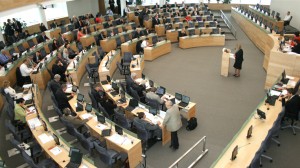
The Lithuanian parliament approved the revision 58-4 with 25 abstentions. Photo by Nathan Greenhalgh.
VILNIUS — The Lithuanian parliament agreed on Tuesday to change the wording in a controversial bill intending to protect minors and has removed any references to homosexuality.
The new wording bans any kind of public discussion, in or out of schools, that encourages children to engage in sexual intercourse. Formerly, it had banned any discussion that cast homosexuality, bisexuality or polygamy in a positive light. It also treats similarly overeating, hypnosis and viewing corpses.
The new wording passed with 58 votes for, four against and 25 abstaining.
The bill, named the Law on the Protection of Minors Against the Detrimental Affects of Public Information, was passed earlier this year despite controversy inside the country and throughout Europe. The Seimas overwhelmingly pushed it through despite a veto by then-President Valdas Adamkus, and up until now has frustrated efforts by President Dalia Grybauskaitė, who said she has kept the bill in committee to write out any “discriminatory aspects.” Amnesty International said that it violated human rights, and the European Parliament passed a non-binding resolution condemning the law.
“The final version is acceptable for the president,” Linas Balsys, spokesman for the president, told Baltic Reports.”It’s maybe not ideal, but it took some efforts to get it through the chambers. It is acceptable for the European standard, and the standard for human rights.”
Balsys said that, even though the bill had such early overwhelming support — and resistance against any changes — an increase in dialogue between parliament members and the president created a smoother transition for the bill. He described the process of changing the language as “routine” and “not difficult” politically.
Critics may take law to Constitutional Court
Members of the Seimas that are against the law echoed Balsys’ reservations about the law.
“I think the final solution is not so bad, but it’s problematic,” Dalia Kuodytė, a member of the Liberal’s Movement Party who has voted against every iteration of this bill, told Baltic Reports.
Vytenis Povilas Andriukaitis of the Social Democratic Party, who has voted against the past two iterations of this bill, abstained from voting. He said that he was “satisfied” with the compromise, but called the spirit of the bill “really dangerous for freedom of speech.” He blamed rampant homophobia in the Seimas for the bill.
Andriukaitis said he was looking to mobilize a group of parliament members to challenge the law in the Constitutional Court.
“From my point of view, we have only one possibility—to go to the court and discuss all regulations in this law,” Andriukaitis told Baltic Reports.
Supporters of the law hailed the revised version as serving its purpose without discriminating against minorities.
“In this law there is more broad category about all sexual relations,” said Valentinas Mazuronis, member of the Order and Justice Party, and has supported the inclusion of the previous language. “I think it’s a normal solution. My opinion in the first law was not discrimination, and in this law I don’t see discrimination too.”
But the law, which has been criticized for the its vague wording, could potentially apply to unintended areas, like sexual education or art courses in schools.
“I’ve heard debates about whether fairy tails could be banned because they do not provide a realistic interpretation of reality,” Balsys said.
“If there is something wrong, or if we see there are problems with implementation or spillover effects which were not initially intended, there are always ways to put another ammendment in, and at the end of the day there’s the constitutional court,” Balsys added. “For the time being, it was important to calm down the negative effect of homophobia and xenophobia.”
Mazuronis said that the bill applies to “propaganda,” and will not affect sexual education or art courses in schools.
“We are not against education, against art,” Mazuronis said.













“But the law, which has been criticized for the its vague wording, could potentially apply to unintended areas,”
vague wording and too quick law proposal writing by non qualified members of the LT parliament is a general problem, this is not the first law like that.
(reminding the law against nazi symbols and the five-cornered star etc.)
The parliament needs training, and maybe the seimas should take more time too make quality laws and not just populistic ones.
I just hope that Grybauskaite will veto more laws and change more people in high government officials….